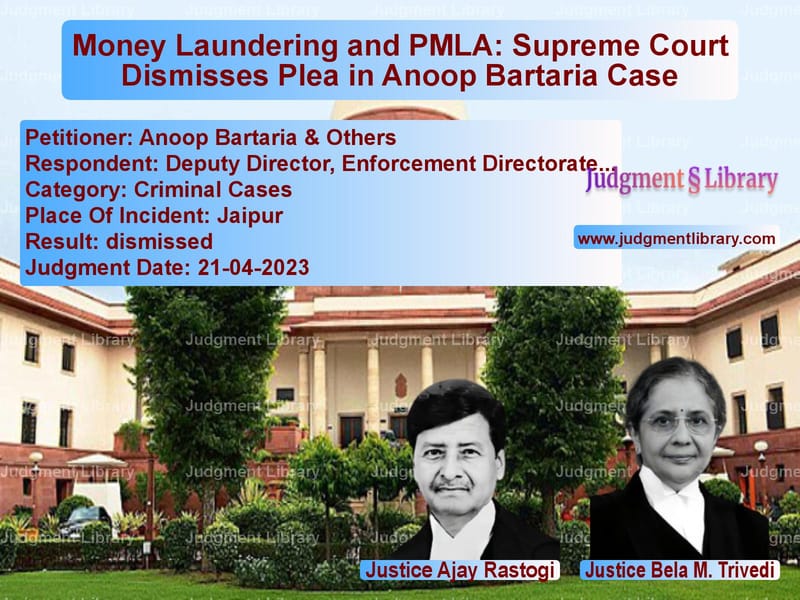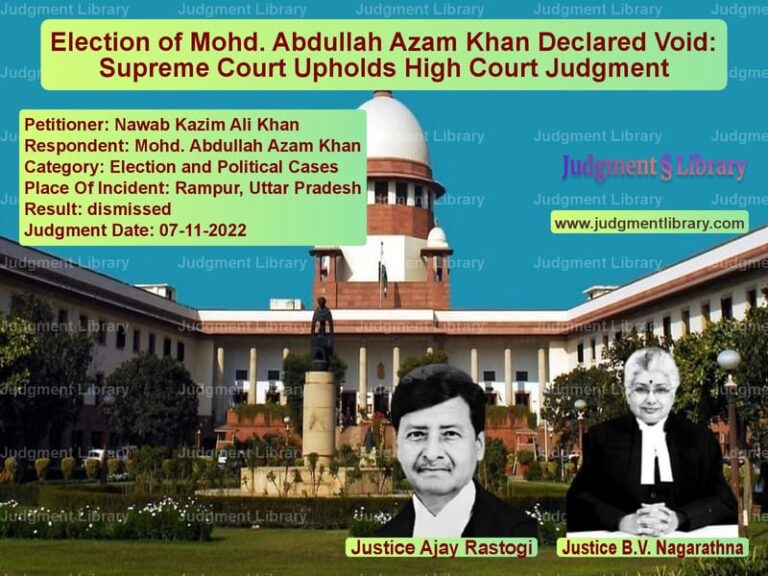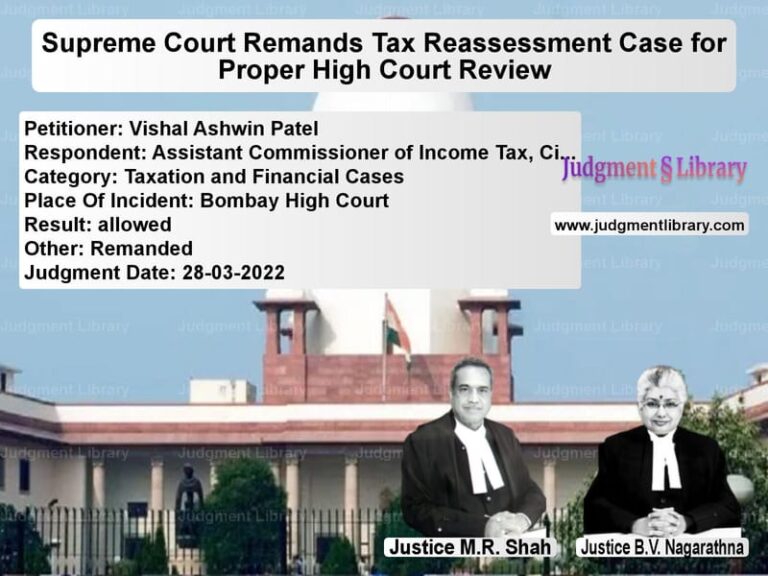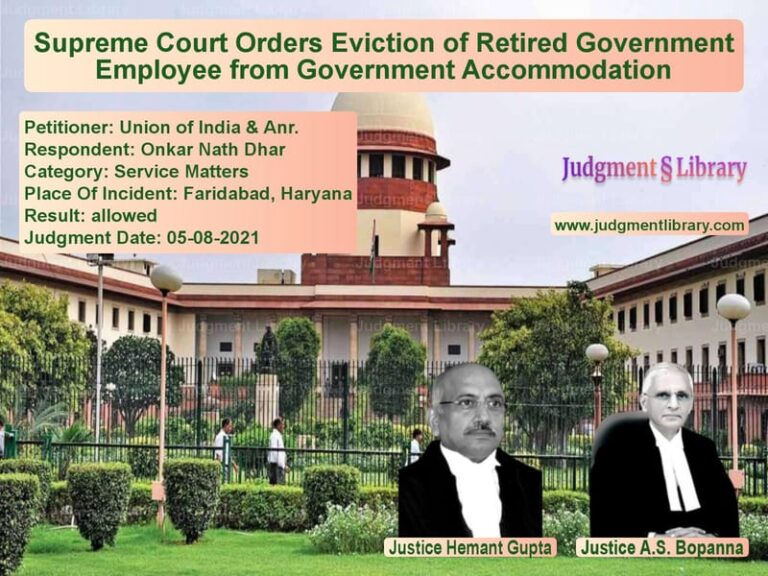Money Laundering and PMLA: Supreme Court Dismisses Plea in Anoop Bartaria Case
The case of Anoop Bartaria & Others v. Deputy Director, Enforcement Directorate & Another is a significant ruling on the application of the Prevention of Money Laundering Act, 2002 (PMLA). The Supreme Court dismissed the petition challenging the prosecution complaint filed by the Enforcement Directorate (ED) in connection with financial transactions linked to alleged fraudulent activities. This judgment reinforces the stringent application of PMLA and sets a precedent on how money laundering cases are interpreted by the judiciary.
Background of the Case
Anoop Bartaria, the Chairman and Managing Director of World Trade Park Ltd., and his company were accused of receiving large sums of money linked to fraudulent banking transactions carried out by Bharat Bomb and his associates. The case originated from an FIR filed by the Central Bureau of Investigation (CBI) against Syndicate Bank officials and Bharat Bomb, alleging financial fraud amounting to ₹1,055.79 crores. Based on this, the ED initiated an investigation under the PMLA, which led to the registration of an Enforcement Case Information Report (ECIR).
The petitioners sought to quash the ECIR and prosecution complaint, arguing that they were not involved in any money laundering activities and had no knowledge that the funds received were proceeds of crime.
Petitioner’s Arguments
Senior Counsel Swadeep Hora, representing the petitioners, presented the following arguments:
- The petitioners were engaged in a legitimate buyer-seller transaction with Bharat Bomb and his associates for commercial units in World Trade Park.
- They had no knowledge that the funds received from Bharat Bomb were proceeds of crime.
- The sale transactions were conducted via demand drafts and RTGS, ensuring transparency.
- The company had obtained NOCs from banks before executing property sales, demonstrating compliance with financial regulations.
- Money laundering under Section 3 of PMLA requires “knowledge or actual involvement” in dealing with proceeds of crime, which was not proven in their case.
- The ED’s investigation and prosecution were an abuse of process, as there was no evidence linking the petitioners to money laundering.
Respondent’s Arguments
Additional Solicitor General, appearing for the Enforcement Directorate, presented counterarguments:
- The petitioners had received over ₹160 crores from fictitious firms operated by Bharat Bomb and his associates.
- Their transactions were structured to launder illicit money obtained through fraudulent banking operations.
- The funds were transferred through multiple fictitious firms to obscure their origins.
- The petitioners’ actions met the definition of money laundering under Section 3 of PMLA, which includes indirect involvement.
- Under the amended Section 45 of PMLA, all offenses under the Act are cognizable and non-bailable, justifying the continuation of proceedings.
Key Legal Issues
The Supreme Court examined the following legal questions:
- Does the lack of direct involvement absolve individuals from liability under PMLA?
- Can financial transactions carried out in the normal course of business still be classified as money laundering?
- How does the court interpret “proceeds of crime” under PMLA?
Supreme Court’s Observations
The Court ruled against the petitioners, holding that:
- “The offense of money laundering does not require direct involvement. Even indirect participation in concealing or handling proceeds of crime is sufficient.”
- “Transactions that appear legitimate on the surface can still amount to money laundering if the source of funds is illicit.”
- “The petitioners were aware of and benefited from financial irregularities linked to a larger fraudulent scheme.”
- “PMLA is designed to curb financial crimes that threaten economic stability, and judicial intervention should not impede its enforcement.”
The Court rejected the petitioners’ argument that they had no knowledge of the source of funds, stating that money laundering includes possession and use of illicit funds, regardless of intent.
Final Judgment
The Supreme Court dismissed the petition, stating:
“The petitioners have failed to make out a case for quashing the ECIR and prosecution complaint. The investigation and prosecution under PMLA shall proceed as per law.”
Legal Impact and Significance
- Reinforces the scope of PMLA: The ruling confirms that PMLA covers indirect involvement in money laundering.
- Strengthens enforcement: Authorities can proceed against individuals even if they are not the primary actors in financial fraud.
- Clarifies liability: Entities engaging in financial transactions must conduct due diligence to avoid dealing with proceeds of crime.
Conclusion
The Supreme Court’s decision in Anoop Bartaria v. ED underscores the broad application of PMLA and reinforces the government’s stance on financial crimes. The judgment ensures that individuals and businesses engaging in high-value transactions must exercise caution to avoid inadvertently participating in money laundering activities. This ruling will likely serve as a benchmark for future cases involving indirect involvement in financial fraud and illicit money transactions.
Petitioner Name: Anoop Bartaria & Others.Respondent Name: Deputy Director, Enforcement Directorate & Another.Judgment By: Justice Ajay Rastogi, Justice Bela M. Trivedi.Place Of Incident: Jaipur.Judgment Date: 21-04-2023.
Don’t miss out on the full details! Download the complete judgment in PDF format below and gain valuable insights instantly!
Download Judgment: anoop-bartaria-&-oth-vs-deputy-director,-enf-supreme-court-of-india-judgment-dated-21-04-2023.pdf
Directly Download Judgment: Directly download this Judgment
See all petitions in Money Laundering Cases
See all petitions in Fraud and Forgery
See all petitions in Corporate Compliance
See all petitions in Judgment by Ajay Rastogi
See all petitions in Judgment by Bela M. Trivedi
See all petitions in dismissed
See all petitions in supreme court of India judgments April 2023
See all petitions in 2023 judgments
See all posts in Criminal Cases Category
See all allowed petitions in Criminal Cases Category
See all Dismissed petitions in Criminal Cases Category
See all partially allowed petitions in Criminal Cases Category







